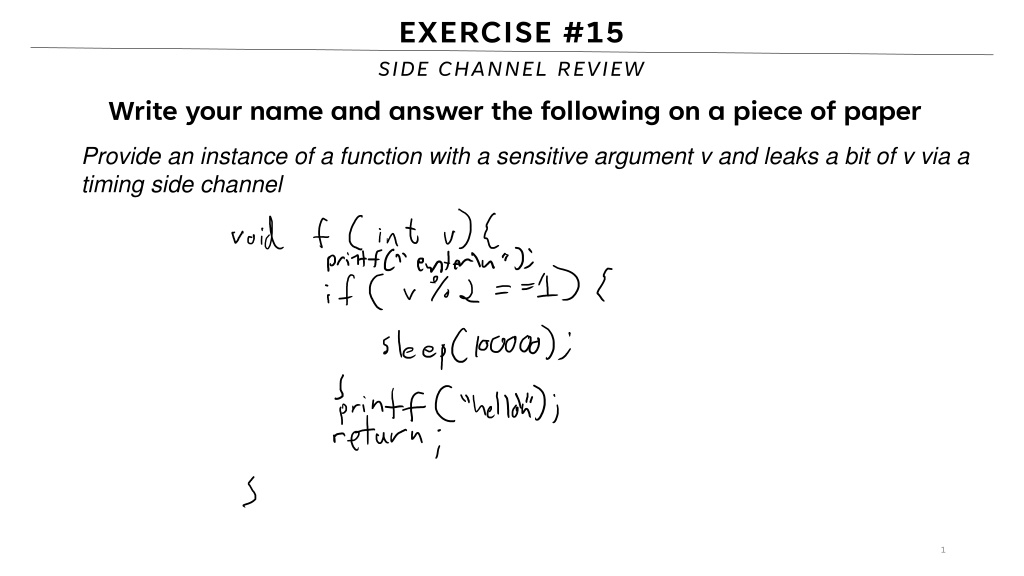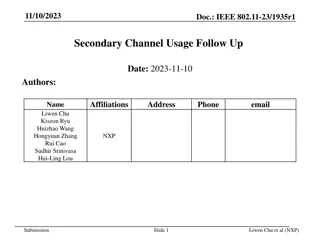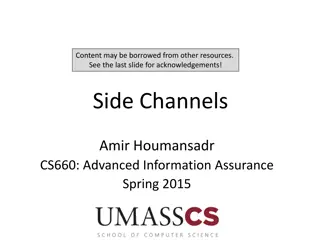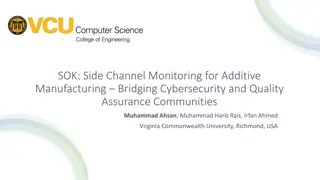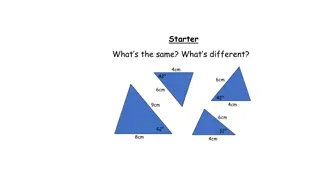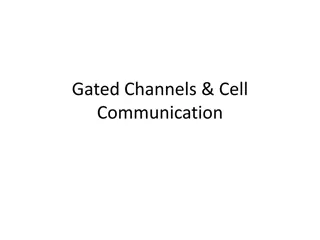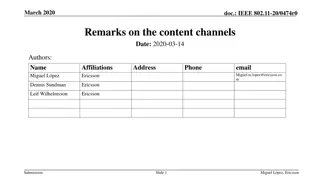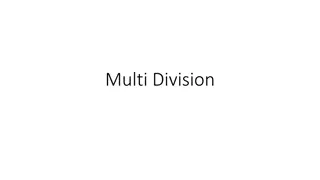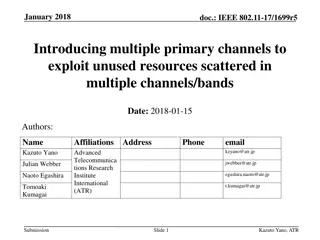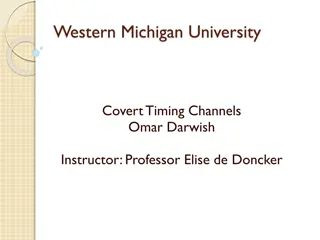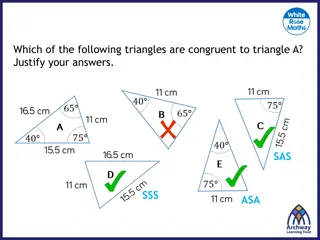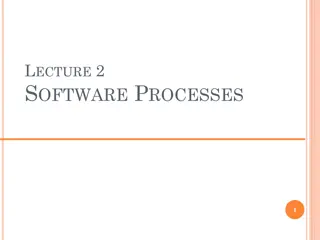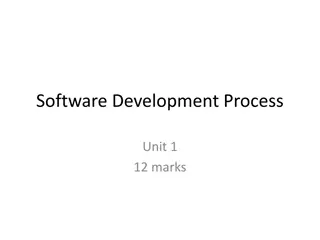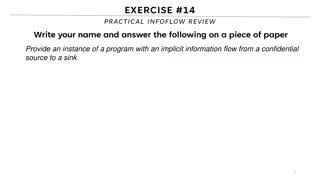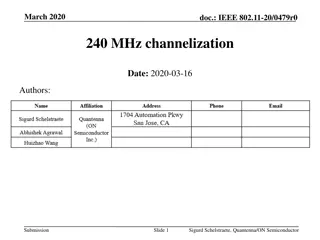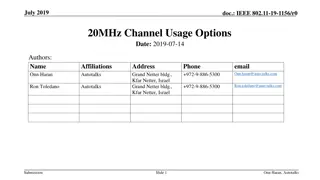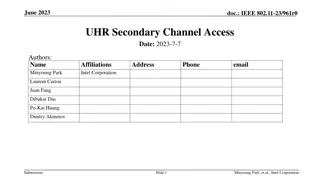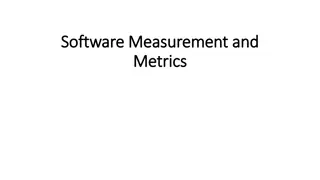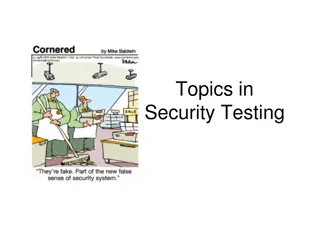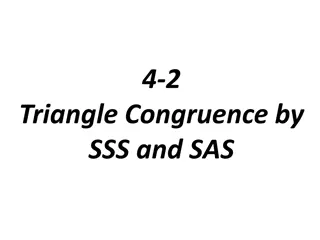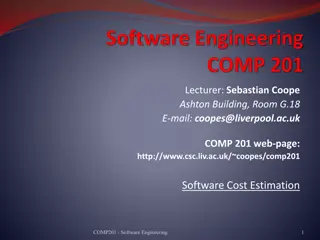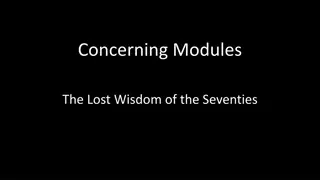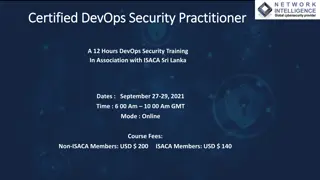Understanding Side Channels in Software Security
This content delves into the topic of side channels in software security, focusing on the leakage of sensitive information through timing side channels. It discusses the concept of covert channels, reference monitors, limitations of analysis, and prevention strategies to mitigate the risks associated with side-channel attacks.
Download Presentation

Please find below an Image/Link to download the presentation.
The content on the website is provided AS IS for your information and personal use only. It may not be sold, licensed, or shared on other websites without obtaining consent from the author. Download presentation by click this link. If you encounter any issues during the download, it is possible that the publisher has removed the file from their server.
E N D
Presentation Transcript
EXERCISE #15 SIDE CHANNEL REVIEW Write your name and answer the following on a piece of paper Provide an instance of a function with a sensitive argument v and leaks a bit of v via a timing side channel 1
Paper review due Sunday at 11:59 PM ADMINISTRIVIA AND ANNOUNCEMENTS
3 CLASS PROGRESS SHOWING SOME APPLICATIONS OF STATIC DATAFLOW DESCRIBED A PARTICULAR TYPE OF EVASION AGAINST EXPLICIT DATAFLOW: SIDE CHANNELS BEGAN TO CONSIDER WHAT WE COULD DO ABOUT IT
4 LAST TIME: SIDE CHANNELS REVIEW: LAST LECTURE UNDETECTABLEVIA (TYPICAL) STATICDATAFLOW General side-channel: using a predictable phenomenon outside of the semantics of the program Covert channel: special instance of a side channel that is used intentionally by the program
REFERENCE MONITORS EECS 677: Software Security Evaluation Drew Davidson
6 OVERVIEW PREVENTING BAD STUFF FROM HAPPENING IN A PROGRAM
LECTURE OUTLINE Overview Details Instances
8 LIMITATIONS OF ANALYSIS REFERENCE MONITORS: OVERVIEW SOFAR, OURFOCUSHASBEENLARGELY ONDETECTINGUNDESIRABLEBEHAVIOR That s valuable! Ask developers to correct their own mistakes Empower users to forgo running bad software
9 LIMITATIONS OF ANALYSIS REFERENCE MONITORS: OVERVIEW DETECTIONMIGHTNOTBEENOUGH May be in a position where we can t run the analysis STATIC ANALYSIS False positives Scalability issues DYNAMIC ANALYSIS False negatives Run time issues
10 A HANDS-ON ALTERNATIVE REFERENCE MONITORS: OVERVIEW KEEPBADTHINGSFROMHAPPENINGDURING SYSTEMEXECUTION Requires some sort of specification for bad things Requires some sort of preventative capabilities
11 PREVENTATIVE CAPABILITIES REFERENCE MONITORS: OVERVIEW SIMPLEFORM Kill the program DATAFLOW FORM Sanitize the data
12 THE BIG IDEA REFERENCE MONITORS: OVERVIEW KEEPPROGRAMSONTHE STRAIGHTANDNARROW - Articulate a policy for allowed behavior - Keep a running record of security-relevant behavior - Prevent a violation of the policy
13 SAFETY POLICIES REFERENCE MONITORS: INSTANCES EXECUTIONOFAPROCESSASASEQUENCEOFSTATES Policy is a predicate on sequence prefix Policy depends only on the past of a particular execution once violated, never unviolates INCAPABLEOFHANDLINGLIVENESSPOLICIES If this server accepts a SYN, it will eventually send a response
LECTURE OUTLINE Overview Details Instances
15 CONSIDER THE REACTIVE ADVERSARY REFERENCE MONITORS: OVERVIEW DEFINITION Reactive Adversary: An adversary with the capability to understand the defense mechanism and an opportunity to avoid it IFA DEFENSECANBEAVOIDEDIT HARDLYMATTERSWHATTHE ENFORCEMENTDOES Recall the history of the Maginot Line
16 SECURITY VS PRECISION REFERENCE MONITORS: OVERVIEW PROGRAM PROXIMITY Far Close Inline reference monitor External reference monitor
17 REFERENCE MONITOR DESIGN REFERENCE MONITORS: INSTANCES KERNELIZED WRAPPER INLINE
18 PROPERTIES WE CARE ABOUT REFERENCE MONITORS: INSTANCES MEMORY SAFETY e.g. Programs respect aggregate type sizes, process boundaries, code v data TYPE SAFETY e.g. Functions and intrinsic operations have arguments that adhere to the type system CONTROL FLOW SAFETY e.g. All control transfers are envisioned by the original program
LECTURE OUTLINE Overview Details Instances
20 OS AS REFERENCE MONITOR REFERENCE MONITORS: INSTANCES COLLECTIONOFRUNNINGPROCESSESANDFILES Processes are associated with users Files have ACLs OS ENFORCESVARIOUSSAFETYPOLICIES - File access - Process space write Same policy for all processes of the same user
21 SOFTWARE FAULT ISOLATION (SFI) REFERENCE MONITORS: INSTANCES ISOLATEPROCESSFAULTSONSHAREDHARDWARE Each process is a logical fault domain Ensure all memory references and jump is within the process fault domain
22 INLINE REFERENCE MONITORS: SASI REFERENCE MONITORS: INSTANCES CORNELLPROJECTFORINLINEPOLICYENFORCEMENT Change the program to enforce any safety policy Express allowed behavior as an FSM Examples: - No division by zero - No network send after file read
23 SASI: COST REFERENCE MONITORS: INSTANCES ATTEMPTSTOMINIMIZETHENUMBEROFCHECKS Looking at every instruction is incredibly expensive Example: only need to check divide-by-zero before DIV instructions
24 CONTROL FLOW INTEGRITY: CFI REFERENCE MONITORS: INSTANCES ENSURETHEPROGRAMCONTROL FLOWISALLOWEDBYTHE CFG In a sense, the policy is the control-flow graph Why would we need to do this?
